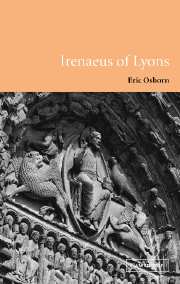Book contents
- Frontmatter
- Contents
- Preface
- List of abbreviations
- Chapter 1 Irenaeus: argument and imagery
- Part I DIVINE INTELLECT
- Part II ECONOMY
- Part III RECAPITULATION
- Part IV PARTICIPATION
- Chapter 7 Logic and the rule of truth: participation in truth
- Chapter 8 Scripture as mind and will of God: participation in truth
- Chapter 9 Aesthetics: participation in beauty
- Chapter 10 Human growth from creation to resurrection: participation in life
- Chapter 11 Goodness and truth: ethics of participation
- Part V CONCLUSION
- Appendix: Gnosticism
- Select bibliography
- Citations from Irenaeus
- Citations from the bible
- Index of classical authors
- Index of patristic authors
- General index
Chapter 8 - Scripture as mind and will of God: participation in truth
Published online by Cambridge University Press: 22 September 2009
- Frontmatter
- Contents
- Preface
- List of abbreviations
- Chapter 1 Irenaeus: argument and imagery
- Part I DIVINE INTELLECT
- Part II ECONOMY
- Part III RECAPITULATION
- Part IV PARTICIPATION
- Chapter 7 Logic and the rule of truth: participation in truth
- Chapter 8 Scripture as mind and will of God: participation in truth
- Chapter 9 Aesthetics: participation in beauty
- Chapter 10 Human growth from creation to resurrection: participation in life
- Chapter 11 Goodness and truth: ethics of participation
- Part V CONCLUSION
- Appendix: Gnosticism
- Select bibliography
- Citations from Irenaeus
- Citations from the bible
- Index of classical authors
- Index of patristic authors
- General index
Summary
We have seen that the rule and apostolic preaching look to scripture for reciprocal demonstration. The bible is the highest source of truth because the prophets were inspired of God. Their visions take the place of Platonic forms and depict the mind and will of God. Just as Alcinous found the criterion of truth in the world of forms rather than in a formula of one line, so the Christian rule of faith expands to a brief statement of scriptural claims behind which lies the universe of biblical imagery. Prophecy moves from future reference to present reality as illuminated by a rebirth of biblical images. These images unite the bible as the divine source of truth in which the believer participates.
Irenaeus provides the first clear evidence of a Christian bible, although his ‘new testament’ is not yet a document (4.9.1). He has a central concern for right use of the scripture (5.20.2) and is commonly contrasted with the Alexandrian fathers because he gave less importance to the place of philosophy and stayed closer to biblical categories. Against heresies draws extensively on new testament writings, mainly Gospels and Acts of the Apostles, then the sayings of the lord and the Epistles of Paul.
Much has been written on Irenaeus' interpretation of the bible. He extols the bible as the measure of truth (2.28.1), perfect because from God (2.28.2), ordered and coherent (1.8.1), and never without meaning (4.31.1).
- Type
- Chapter
- Information
- Irenaeus of Lyons , pp. 162 - 192Publisher: Cambridge University PressPrint publication year: 2001

